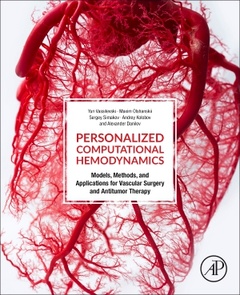Personalized Computational Hemodynamics Models, Methods, and Applications for Vascular Surgery and Antitumor Therapy
Auteurs : Vassilevski Yuri, Olshanskii Maxim, Simakov Sergey, Kolobov Andrey, Danilov Alexander

Personalized Computational Hemodynamics: Models, Methods, and Applications for Vascular Surgery and Antitumor Therapy offers practices and advances surrounding the multiscale modeling of hemodynamics and their personalization with conventional clinical data. Focusing on three physiological disciplines, readers will learn how to derive a suitable mathematical model and personalize its parameters to account for pathologies and diseases. Written by leading experts, this book mirrors the top trends in mathematical modeling with clinical applications. In addition, the book features the major results of the "Research group in simulation of blood flow and vascular pathologies" at the Institute of Numerical Mathematics of the Russian Academy of Sciences.
Two important features distinguish this book from other monographs on numerical methods for biomedical applications. First, the variety of medical disciplines targeted by the mathematical modeling and computer simulations, including cardiology, vascular neurology and oncology. Second, for all mathematical models, the authors consider extensions and parameter tuning that account for vascular pathologies.
1. Introduction2. Basic facts about a human cardiovascular system3. Patient-specific geometric modelling4. General equations of motion5. 3D vascular and heart hemodynamics6. 0D lumped models7. 1D vascular hemodynamics 8. Hemodynamics in capillary networks and angiogenesis9. Applications in vascular surgery10. Applications in antitumor therapy11. Summary
Graduate students and researchers focusing on mathematical modeling in biomedicine, computational biology
Maxim Olshanskii is currently professor of Mathematics at the University of Houston. He also holds adjunct professorships at Department of Mathematics and Computer Science at Emory University. He was previously professor at the Department of Mathematics and Mechanics at Moscow State University. He received his PhD degree from Moscow State University (1997) and second doctorate (Habilitation) in Mathematics from the Institute of Numerical Mathematics, Russian Academy of Sciences (2006). His research interests are in numerical analysis and scientific computing, with applications to fluid problems, interface and free boundary problems, geometric PDEs, and cardiovascular models. He is a recipient of research awards by multiple agencies in USA, Russia and Germany as well as the Prize of the European Academy for Russian young scientists (2001). From 2014 he serves as the Managing Editor of the Journal of Numerical Mathematics.
Sergey Simakov is the deputy chair of the department of compu
- Examines a variety of medical disciplines targeted by mathematical modeling and computer simulation
- Discusses how the results of numerical simulations are used to support clinical decision-making
- Covers hemodynamics relating to various subject areas, including vascular surgery and oncological tumor treatments
Date de parution : 04-2020
Ouvrage de 280 p.
19x23.3 cm
Thèmes de Personalized Computational Hemodynamics :
Mots-clés :
Angioadaptation; Antiangiogenic drugs; Antiangiogenic therapy (AAT)Chemotherapy (CT)Growth rate; Blood vessels; Blood; Capillaries; Capillary networks; Cardiac cycle; Cardiovascular system; Carotid artery; Centerline; Chambers; Compartment; Computed tomography (CT)Heart; Continuum mechanics; Deformation; Finite element method (FEM)Fluid–structure interaction; Flow rate; Fluid; Heart; HeartFlow software; Hemodynamic equation; Hemodynamic model; Hydrodynamics; Interstitial fluid (IF)Malignant tumor; Large vessels; Left coronary artery; Left ventricle; Lumped models; Magnetic resonance imaging (MRI)Medical imaging; Malignant tumor; Microcirculatory networks; Multicellular tumor spheroids (MCTS)Navier–Stokes equation; Navier–Stokes equations; Ordinary differential equations (ODEs)Phantoms; Plasma; Right coronary artery; Right ventricle; Simulation; Smagorinsky turbulence model; Streamline upwind Petrov–Galerkin (SUPG) foundation; Structure; Vascular endothelial growth factor (VEGF)Ventricles



